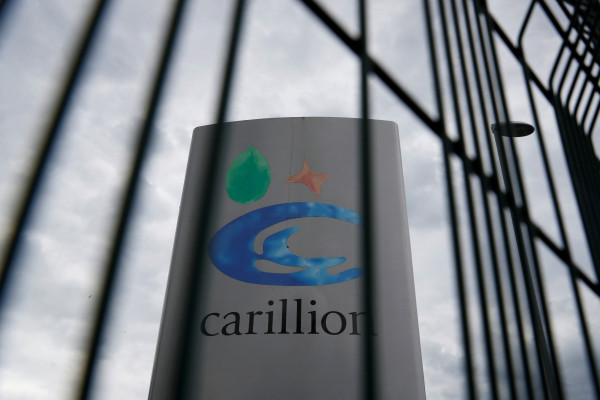

Carillion, which has 13 final salary schemes in the UK with more than 28,500 members, and a deficit of £587m at the end of July, made an application to the High Court for compulsory liquidation this morning (15 January).
Ian Browne, pensions expert at Old Mutual Wealth, argued this case adds to the pressure for the government to tackle the sustainability of the DB schemes in its expected white paper.
Mr Browne said: "The government are expected to issue a white paper on the future security and sustainability of DB schemes soon and the pressure is on for them to deliver.
"A green paper, on the same topic, appeared in February last year, which stimulated discussion, but showed they were a long way from reaching a conclusion."
The Department of Work & Pensions (DWP) has been working on its white paper on DB schemes, which was first expected to be published in 2017, and then delayed to February 2018.
The paper, which follows a consultation launched in February into what needed to be done to ensure confidence and secure the future of these schemes, will consider the need to adapt the regulatory regime.
However, Guy Opperman, minister for pensions and financial inclusion, said last week in Parliament that the document will "be delivered at some stage this spring".
He said: "Spring is an elastic term in the House of Commons […], but it will certainly be delivered before the summer period."
Steven Cameron, pensions director at Aegon, told FTAdviser that he expects "not just the timing, but also the content" of the document is elastic.
He said: "The DB landscape continues to change rapidly and proposals which might have looked reasonable a year ago may no longer look fit for purpose.
"Coupled with this, it is highly likely that changes to DB rules and regulations, which look attractive to sponsoring employers are less so for members and vice versa, making potential changes highly contentious.
"In the meantime, we expect the demand for advice on whether or not to transfer out of DB schemes will continue to rise."
For Sir Steve Webb, director of policy at Royal London, a few months' delay won't make much difference, simply because he doesn't expect the new document "to propose anything very radical".
He said: "Despite various high-profile cases, the government take the view that the regulatory framework is broadly appropriate.
"We may see some limited increases in the power of the regulator, perhaps to cover extreme cases like BHS, but even these would not be implemented for some years as the government needs to find Parliamentary time to get legislation through and then consult on the detail.
"I think it will be business as usual for DB schemes in terms of the law for many years to come."
According to Nathan Long, senior pensions analyst at Hargreaves Lansdown, this delay is "surely down to the scale and complexity of the issues being covered."
He said: "On the one hand, the government want to ensure schemes are sustainable, with businesses continuing to prosper and providing jobs.
"On the other, any dilution of member pension benefits will erode the fragile confidence in pensions that is slowly returning following the good work of auto-enrolment."
Carillion, which employs about 43,000 people, has been struggling for several months, issuing a profit warning last year that sank its share price – which has fallen from more than £2 a year ago to about 14.2p this morning.
When a firm becomes insolvent and the pension scheme is passed to the PPF, the assets of the scheme are also passed over to the pensions lifeboat.
According to Carillion's last annual report, its schemes have assets of £2.57bn and liabilities of £3.37bn.
The exact size of the impact on the PPF will not be the same as the headline deficit on the pension scheme, but it is likely to be well in excess of half a billion pounds.
Frank Field MP, chair of the Work and Pensions select committee, isn't surprised with the recent developments in the company.
He said: "Carillion took on mega borrowings while its pension deficit ballooned. We called over a year ago for The Pensions Regulator to have mandatory clearance powers for corporate activities like these that put pension schemes at risk, and powers to impose truly deterrent fines that would focus boardroom minds.
"If government had acted then, the brakes might have been put on Carillion's massive ramping up of debt and it never would have fallen into this sorry crisis.
"It seems we have a new case like this every week, and this one is particularly disastrous, with massive job losses and 28,000 current and future pensioners at risk. I would like to ask the government today: what more is it going to take?"
The chairs of the Carillion pension schemes will now be working with PWC, appointed special managers to official receiver of the company, and with the PPF, "to deliver detailed information to members about how their benefits will be affected, and provide them with all the support that we can," they said.
The chairs added: "We are in the process of issuing an initial communication to all members, and we will make further information available as soon as possible, including by establishing a dedicated web page."
According to Nicola Parish, executive director at The Pensions Regulator (TPR), the watchdog will "continue to work closely with all relevant parties in what are very challenging circumstances, including the pension scheme trustees, the official receiver and the government, to help achieve the best possible outcome for members of the pension schemes and those impacted by the situation".
She said: "It is too early to comment on possible outcomes for the various pension schemes connected to Carillion.
"In the meantime, I would like to assure scheme members that the government set up the PPF to support members of workplace pensions in precisely these circumstances."
maria.espadinha@ft.com



